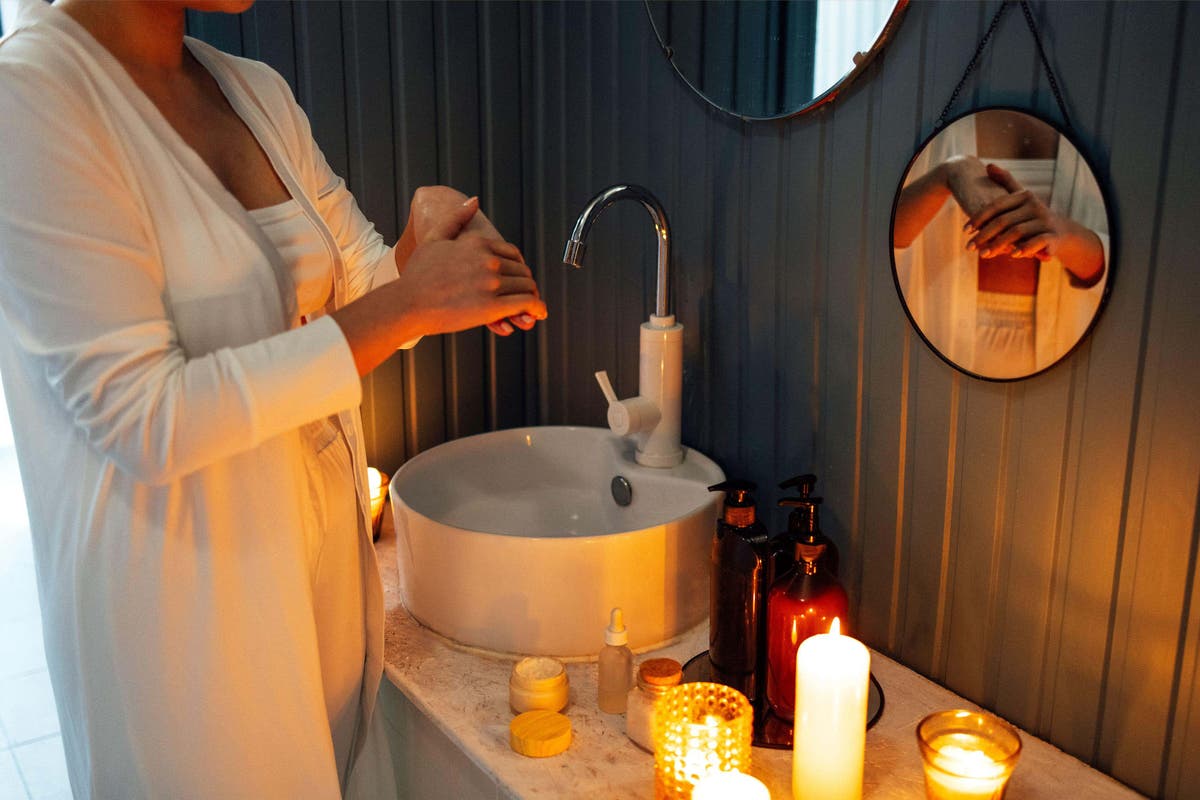
Your night time routine may consist of a quick cleanse and a dash of moisturiser – or perhaps it involves lighting a scented candle. However you prepare for bed, this night time ritual has a crucial impact on the quality of your sleep. “The products we use in our evening skincare routines can influence not only the condition of our skin but also our ability to relax and wind down,” explains organic beauty expert and Green People founder, Charlotte Vøhtz.
“Harsh products with synthetic fragrances or active ingredients like exfoliating acids can be overstimulating or irritating, which could make it more challenging to relax before bed.” Certified dermatologists and beauty experts break down the perfect beauty routine for a restful night’s sleep. What can help you sleep When you think of night time scents, perhaps lavender or chamomile spring to mind.

This is for good reason, as these two flowers are both nervines (herbs that specifically help support the nervous system). Both lavender and chamomile are considered fragrant relaxants and contain essential oils that help relieve stress and support sleep. “ Valerian , vetiver, clary sage, sandalwood and ylang ylang are also relaxing-inducing plants,” says skin expert and Ultrasun founder, Abi Cleeve.
“Aromatherapy – be it in bath salts, pillow sprays or even candles – can massively help with relaxation,” says Lucy Goff , founder of LYMA – the skincare label coveted by the likes of Gwyneth Paltrow and Meghan Markle. Whilst what we breathe in is an important instigator for falling asleep, the quality of it also depends on what we ingest. “Supplements can improve sleep quality,” says Goff.
Minerals such as magnesium glycinate in particular relaxes both the nervous system and your muscles. “A clinical trial found magnesium could also reduce anxiety by up to 31%,” says dermatologist, Dr Sonia Khorana , from Hero Cosmetics . “Vitamin D, Valerian, melatonin and ashwagandha are also ingredients to look out for for improved sleep quality.
” Having experienced sleep deprivation herself, Goff developed her own supplement, “It has key patented ingredients that enhance aspects of brain function to improve sleep quality,” she says, “it’s designed to move away from ‘knock-you-out sedatives’ that compromise daytime function.” Alexandra Kay Time to Restore Magnesium Lotion – 200ml, £40, Green People Neal’s Yard Remedies Lavender Essential Oil – 10ml, £9 (was £12) LYMA Supplement Refill – 120 capsules, £165, Healf Products to avoid – from eye creams to exfoliants We know that caffeine and blue light (emitted by phone and TV screens) can trick our brains into thinking it’s daytime by prohibiting the release of melatonin, the sleep hormone. But caffeine isn’t just found in coffee.
“Some beauty products, like eye creams or serums, contain caffeine to reduce puffiness or dark circles,” says Vøhtz. “These products may interfere with your ability to fall asleep if applied too late in the evening.” It’s not just your eye cream that could impact your sleep; chemical exfoliants can also disrupt your rest.
“Exfoliators containing AHAs or BHAs can make the skin more sensitive or irritated, especially at night,” says Vøhtz. “If your skin is inflamed or sensitised, it could prevent you from getting comfortable and might not be ideal just before bed.” Alongside harsh ingredients, scent is a crucial aspect of your products that can interfere with your natural sleep cycle.
“Uplifting fragrances such as citrus and jasmine are big ones to avoid,” says Cleeve, “they are great for sleepy mornings though!” Vøhtz notes that synthetic ingredients can also overstimulate your senses: “Synthetic fragrances in skincare products can cause sensitivities or headaches in some people, further disrupting your ability to wind down.” Kiehl’s Midnight Recovery Eye – 15ml, £33, Look Fantastic An expert’s beauty routine for a good night’s sleep While this may have left you checking the labels on your night creams, there’s a simple solution to reclaiming your beauty routine for a better night’s sleep. “Your skin enters a reparative phase while you sleep, so an effective skincare routine is crucial,” explains Khorana, who advises blocking out blue light at least two hours before bed.
“I have a no tech after 8pm rule,” says Goff, “otherwise I’d be responding to emails all night. Instead, I use that time to unwind – I double cleanse using the LYMA Laser to drain away the day, so my skin is replenished and can start repairing itself as I go to bed.” When it comes to products, the experts recommend double cleansing to give your face a draining massage and to extract all impurities.
“I recommend starting with a cleansing oil or balm, then follow with a gel to ensure skin is soft and clean,” says Khorana. “Follow with a retinoid serum – also known as vitamin A – as retinoid promotes faster cell turnover and has anti-ageing properties that improve fine lines, wrinkles and improve collagen stimulation in the skin.” (Collagen is what keeps our skin plump).
“If you have dry skin, use a rich night cream with hydrators such as hyaluronic acid and ceramides which lock in moisture,” says Khorana. At the end of a long day, slaving over a laborious skincare routine may be the last thing you want to do, but investing time in relaxing rituals can improve your energy in the long run, as Vøhtz says, “beauty sleep is more than just a saying. Emma Hardie Moringa Cleansing Balm with Professional Cleansing Cloth – 100g, £52, Look Fantastic Facetheory Peptide Firming Night Cream Lavender – 50ml, £24 The Ordinary Granactive Retinoid 5% in Squalane – 30ml, £12.
24 (was £15.90).













